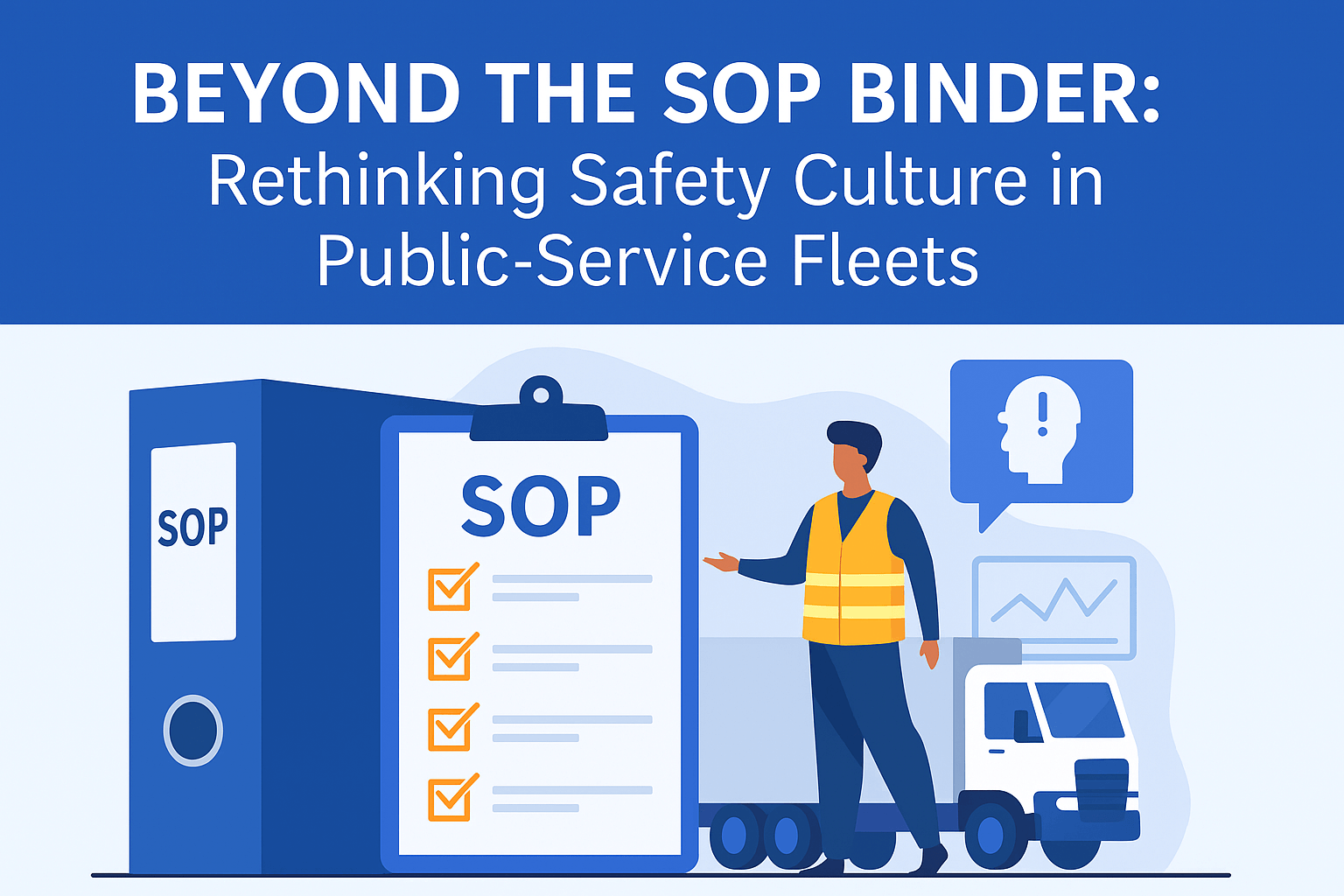
In today’s business landscape, sustainability is no longer just a buzzword, it’s a business imperative. As global regulations around emissions and environmental practices become more stringent, many companies have adopted sustainable fleet management practices to ensure compliance. However, forward-thinking businesses are realizing that embracing sustainability isn’t just about meeting minimum requirements. It can be a powerful competitive advantage, driving new business and strengthening long-term customer relationships.
Fleet managers and environmental health and safety professionals are at the forefront of this shift, with a unique opportunity to leverage sustainable practices to differentiate their companies in the marketplace. This article will explore how prioritizing eco-conscious fleet operations can do more than reduce carbon footprints—it can unlock new growth opportunities, improve brand perception, and position your organization as an industry leader.
The Changing Business Landscape: Why Sustainability Matters Now More Than Ever
Across industries, clients, partners, and consumers are increasingly prioritizing sustainability. A recent study by Nielsen revealed that 73% of global consumers are willing to change their consumption habits to reduce environmental impact, and businesses are feeling the pressure. Companies that demonstrate a commitment to sustainability often find themselves at the top of vendor lists, with sustainability becoming a deciding factor in contract awards.
Many businesses are asked by their clients or stakeholders to report on their environmental impact, including how they manage their fleets. This shift means that sustainability is no longer a “nice to have”—it’s becoming a requirement in many procurement processes. Companies that fail to adopt environmentally friendly practices risk falling behind their competitors who recognize the value of sustainability as part of their business strategy.
For many fleet managers, the primary driver behind adopting sustainable practices has been compliance with governmental and industry regulations. With emissions standards tightening and new policies aimed at reducing carbon output, many companies have made incremental changes to their fleet operations. However, businesses that go beyond compliance and embrace sustainability as a core part of their strategy are reaping additional benefits.
By transitioning from a “check-the-box” approach to sustainability to a more proactive, innovative mindset, fleet managers can open new revenue streams and create lasting value for their organizations. Leading businesses in the fleet industry are looking beyond simply reducing fuel consumption or purchasing more fuel-efficient vehicles—they are incorporating sustainability into their brand identity, offering customers and partners a compelling reason to choose them over competitors.
Business Case for Sustainable Fleets: Attracting New Clients and Contracts
For companies seeking to attract new clients or expand into new markets, sustainability can be a significant differentiator. Many large corporations and government agencies now require their suppliers to meet strict environmental standards. Businesses that can demonstrate eco-friendly fleet operations will be better positioned to win contracts with environmentally conscious clients.
Fleet managers who embrace sustainability can offer clients more than just a logistics service—they offer a partnership in environmental responsibility. For example, companies that track and report their emissions reduction efforts using telematics, fuel-efficient driving practices, or electric vehicles can provide quantifiable data that helps their clients meet their own sustainability goals. In industries like retail, transportation, and construction—where environmental impact is increasingly scrutinized, working with an eco-conscious fleet partner can be a critical selling point.
Moreover, eco-friendly fleets can attract clients looking to enhance their brand image by associating with companies that prioritize environmental stewardship. By choosing a partner with sustainable practices, clients can improve their own corporate social responsibility (CSR) standing, creating a win-win for both sides.
Enhancing Brand Reputation and Building Long-Term Customer Loyalty
In addition to winning new business, sustainable fleet practices can significantly enhance a company’s brand reputation. Businesses that lead in sustainability are perceived as more innovative, responsible, and future-focused. Clients want to partner with organizations that align with their values and can support them in achieving their environmental goals.
Building a brand around sustainability also helps companies establish stronger, long-term relationships with their customers. For instance, businesses that integrate eco-friendly initiatives into their fleet operations can differentiate themselves in highly competitive markets. Offering clients real-time reporting on emissions reductions, sharing data on eco-driving practices, or providing insights on how the client’s own operations can be made more sustainable to create value beyond the service itself.
Future-Proofing Your Business in a World of Evolving Regulations
As environmental regulations continue to evolve, companies that invest in sustainable fleet practices now are future proofing their business. Transitioning to electric or hybrid vehicles, investing in telematics, and implementing efficient driver training programs are all ways to reduce emissions while preparing for stricter regulations in the future.
Beyond compliance, these initiatives can also reduce operational costs in the long term. Fleet managers who adopt sustainability measures can benefit from fuel savings, lower maintenance costs, and reduced downtime as their vehicles operate more efficiently. The combination of reduced operating costs and increased competitiveness in the marketplace can have a substantial impact on a company’s bottom line.
The Role of Technology in Driving Sustainable Fleet Practices
One of the most effective ways to enhance fleet sustainability is through the use of technology. Advanced telematics systems, for instance, allow fleet managers to monitor driver behaviors, such as excessive idling, harsh braking, or inefficient route planning, all of which contribute to increased fuel consumption and emissions. With this data, managers can implement more effective training programs, offering drivers real-time feedback and incentivizing eco-friendly driving behaviors through gamification.
Additionally, electric vehicles (EVs) and hybrid technologies are becoming more accessible, allowing fleets to transition to cleaner energy sources. Early adoption of EVs not only reduces emissions but also demonstrates a commitment to innovation, positioning your business as an industry leader in sustainability.
How to Get Started: Building a Business Case for Sustainable Fleet Investments
Fleet managers who want to make the case for sustainability should start by quantifying the financial and operational benefits of eco-friendly practices. Identify potential fuel savings, reduced maintenance costs, and any tax incentives or grants available for investing in electric vehicles or other green technologies. Presenting a solid business case to senior leadership, backed by data and projected ROI, can help secure the investment needed to adopt more sustainable practices.
It’s also essential to start small and scale up. Begin by implementing one or two key initiatives—such as using telematics to track fuel consumption or rolling out a training program focused on eco-driving—before expanding into larger, more costly projects like transitioning to EVs.
Conclusion: Seizing the Competitive Advantage of Sustainability
In today’s competitive marketplace, sustainability is no longer just a compliance issue, it’s a powerful tool for growth. Fleet managers who embrace eco-conscious practices can differentiate their businesses, attract new clients, and build long-term customer loyalty. By investing in sustainable fleet management, companies are not only reducing their environmental impact—they are positioning themselves as leaders in a rapidly changing, environmentally focused world.
Adopting sustainable practices today isn’t just good for the planet, it’s good for business.







